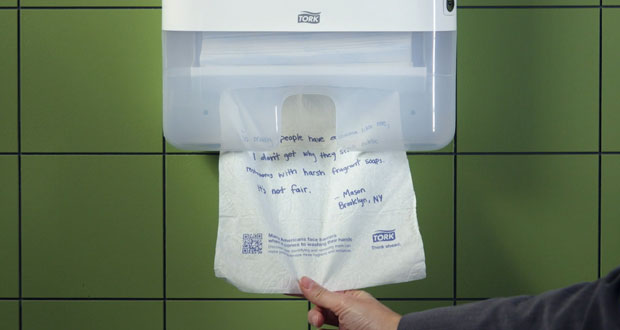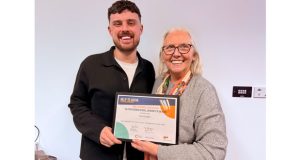New research from Tork shows nearly half of respondents (44 per cent) feel anxious about using public washrooms; Tork aims to improve public washroom experience.
Tork, an Essity brand and global leader in professional hygiene, has announced its commitment to advancing inclusive hygiene in public washrooms. Tork aims to explore how hygiene in public washrooms, often the busiest rooms in a facility, can be improved. This also includes helping to make them more comfortable for both users and cleaning staff, regardless of health conditions, abilities, neuro-diversities, general hygiene concerns or stage of life.
Barriers to pursuing comfortable hygiene in public washrooms challenge people every day; some barriers are visible, others are not. Washroom users can be challenged by a wide range of factors including the inability to access soap and hand towel dispensers, loud noises, lack of privacy or cleanliness.
According to the inaugural 2024 Tork Insight Survey, many individuals are not comfortable using a public restroom, which negatively impacts their well-being. This keeps them from participating in social activities – including enjoying food and drink in public – staying at a job and generally feeling safe. Key findings include:
- When people are unable to wash their hands, they don’t feel safe
- 73 per cent of respondents feel unsafe if they can’t wash their hands
- Poor washroom experience impacts business
- 73 per cent say a bad washroom experience in a restaurant will impact their willingness to return
- 38 per cent of people avoid eating or drinking to limit their use of public washrooms
- Poor washrooms are a reason people leave their jobs
- One in six respondents (17 per cent) said they left a job because of a poor washroom
- Respondents consider access to public washrooms when planning social events or travel
- 26 per cent of respondents avoided a social event because of concerns about access to public washrooms
- 44 per cent plan their travel route to ensure access to washroom
“Comfortable access to public washrooms isn’t just about convenience, it’s a public health need,” said Jenny Logenius, Global Brand Manager, Essity. “Washrooms are the busiest room in a facility and our research reaffirms that washrooms often aren’t equipped to accommodate the constantly changing capabilities of the population at large. This influences an individual’s ability to participate in social gatherings and work, their inclination to buy food or drink or dine at a restaurant and even what routes they choose to travel. Alongside experts and stakeholders, we aim to explore and solve the ways that hygiene in washrooms can be more comfortable for the majority of users.”
Tork first announced its aim to improve inclusive hygiene in public washrooms at the Reuters Responsible Business USA 2024 event in New York City. Amie Kromis, DEI Director for Essity North America, joined leaders from around the world to explore how organisations can improve the environmental and societal sustainability of their operations and solutions. At the event, printed Tork paper towels featured hand-written notes from individuals who face barriers to hand hygiene. Installed in the washrooms, these towels were part of the Tork brand’s effort to spotlight real experiences and educate leaders at the place where barriers occur.
“Many people around the world experience barriers, discomfort, or anxiety when they try to properly wash and dry their hands in a public or workplace washroom,” said Ron Clemmer, Secretariat Director of the Global Handwashing Partnership. “We know that hand washing is critical for reducing the spread of disease and having the integrity of good hygiene, but it isn’t easily accessible for everyone. We applaud Tork for leading the charge on this important initiative and continuing to push for attention and improvement of the accessibility of hand washing in public and workplace washrooms. Through these efforts, they are paving the way to make it easier for everyone to be able to wash their hands properly in these settings.”
This summer, Tork and the Global Handwashing Partnership hosted an inclusive hygiene-focused roundtable in Washington, D.C. By convening experts and facilitating discussion, the event aimed to elevate the conversation around inclusive hygiene in public washrooms and identify areas for change. Experts and leading voices representing public and private organisations met to review the new data, share expertise and work toward a greater understanding of the issues.





